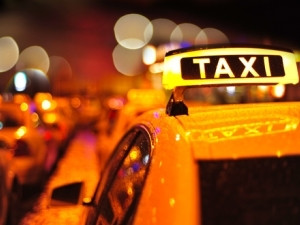Popular ride-sharing service Uber has been operating for almost a year in South Africa, with services in Johannesburg, Durban and Cape Town. It will be interesting to see what hurdles the service faces, compared to the stiff resistance it has encountered elsewhere in the world - already some rumblings are being heard.
In the minibus space, we don't have taxi companies. We have criminal syndicates.
Uber, if you aren't familiar with it, is what happens when crowdsourcing meets taxi services. Uber matches up drivers with passengers, providing the former with a cloud service for management and billing, and the latter with a smartphone interface to summon, track, and pay for the ride.
This is a win-win - ad hoc drivers can sign up for as little or as much driving time as they want, earning taxi fares to supplement workday income. Passengers get a slick interface with concrete knowledge of when their ride will arrive (drivers are GPS tracked), and a quality assurance. Drivers and passengers rate one another after the drive, and anyone without a high rating is simply rejected - drivers don't get rides, and passengers don't get lifts.
It's an ingenious system, using the cloud to deliver the service taxi passengers have wanted for years, and predictably the established industries immediately tried to shut them down.
Terrified of being out-performed, taxi companies went on the offensive. Cab drivers picketed in London. Intense political lobbying tried to raise regulatory hurdles to outlaw unregulated lift-sharing. Taxi services have been artificially constrained for decades, with "medallions" permitting carriage jealously hoarded, for example.
The simple fact is that Uber (and its competitors, notably Lyft, with whom it is engaged in, possibly ironically, spiteful rivalry) provides a better service. Not always cheaper, but consistently better, in ways that matter. The only genuine regulatory concern is that casual lift-sharers do need to make sure their insurance is up to snuff for carrying paying passengers, and Uber takes care of that anyway - it vets drivers, vehicles and insurance. Fears of assault are largely overblown - that can happen in a black cab too, and Uber gives you a better safety net: concrete GPS data of where an offense occurred, and an immediate mechanism to report abuse and block that driver from the system.

So it's a classic case of upstart technology disrupting old-fashioned business, and the latter over-reacting instead of shaping up, right? Well yes, but South Africa might be different.
There's taxis and taxis, of course. Uber is competing with metered cabs, not minibus taxis, and that's the only factor that might save it. In the minibus space, we don't have taxi companies. We have criminal syndicates. Organisations with a track record of open warfare with one another, with law enforcement, and with potential competitors. We don't just picket in South Africa; we set fire to buses, shoot drivers, and intimidate passengers.
Luckily, those guys aren't Uber's target - the mass market, highly-lucrative minibus operations won't feel the Uber pinch, and won't need to fight back. It's the metered cabs, which have been growing in number in recent years with several companies emerging as leaders in coverage and fleet quality that are the networks that Uber and its compatriots want to displace.
How they will respond is anyone's guess. But no one likes to be pushed out of business, after all, and the rival drivers don't have the wherewithal to up their game - that's in the hands of their fleet companies.
Some might show enlightenment, embracing similar technology and competing on quality, but don't count on it: if New York and London didn't, why would Johannesburg? Some might compete on price, but it's a business with tight margins and that risks compromises in other areas, like lowered mechanical or safety standards. Some will lobby for inhibitive regulation - the Western Cape Metered Taxi Council recently broke cover to complain that Uber should be held to be illegal. Some might convert, becoming Uber drivers, though they may learn the hard way that Uber's grand promises of improved revenue are only hypothetical. And some, well, some may fight back. Calling an Uber cab and beating up the driver when he arrives is a low-tech solution to the problem.
So far, Uber is barely on the radar locally. But when it grows, as it surely will, expect pushback. Maybe they'll all play nice, but I wouldn't count on it. Taxis aren't famous for gentlemanly business conduct: not here, not anywhere in the world.
Share